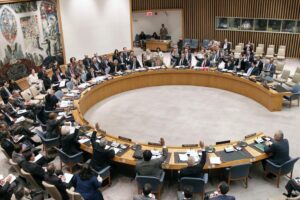 In a recent development at the United Nations, Algeria, Sierra Leone, Guyana, and South Korea have been unanimously elected to serve on the UN Security Council for the 2024-2025 term. Meanwhile, Slovenia emerged victorious in a competitive race against Belarus for the only contested seat.
In a recent development at the United Nations, Algeria, Sierra Leone, Guyana, and South Korea have been unanimously elected to serve on the UN Security Council for the 2024-2025 term. Meanwhile, Slovenia emerged victorious in a competitive race against Belarus for the only contested seat.
The UN Security Council consists of 15 members, including five permanent members (United States, Russia, China, France, and the United Kingdom) and ten countries elected for two-year terms, with half of the seats renewed annually while adhering to geographical distribution rules.
During the secret ballot vote held in the General Assembly, Slovenia and Belarus competed for the Eastern European seat. Slovenia garnered an impressive 153 votes, compared to Belarus’ 38 votes.
Louis Charbonneau of Human Rights Watch expressed the significance of the vote, stating, “Today’s vote in the General Assembly shows why competition in UN elections is crucial.” Charbonneau added that UN member states clearly deemed Belarus unfit for the Security Council due to its serious human rights violations domestically and its attempts to conceal Russian atrocities in Ukraine. The Security Council plays a vital role in safeguarding human rights.
The remaining four seats, representing Africa, Asia-Pacific, and Latin America/Caribbean, had single candidates. Algeria received 184 votes, South Korea secured 180 votes, Sierra Leone obtained 188 votes, and Guyana received 191 votes.
Starting from January 1, 2024, the newly elected countries will replace the current representatives from Albania, Brazil, Gabon, Ghana, and the United Arab Emirates. They will join the five permanent members with veto power and the five countries elected last year: Ecuador, Japan, Malta, Mozambique, and Switzerland.
Sierra Leone’s Foreign Minister, David Francis, described it as a “great day” for his nation, highlighting their successful transition from war to peace. Returning to the Council after 53 years, Francis acknowledged his country’s firsthand experience with civil war and deeply divided communities. He emphasized his commitment to leverage this experience on the Security Council and acknowledged the United Nations’ significant role in deploying peacekeeping and peace support operations.
For South Korea and Guyana, this marks their third tenure on the Council, while Algeria assumes the position for the fourth time.

ByteDance Refuses TikTok Sale Despite US Pressure, Plans Legal Challenge
Harvey Weinstein’s Rape Conviction Overturned, Paving Way For New Trial
Biden Administration Imposes New Sanctions On Iran Following Attack On Israel
Israel’s European Allies Urge Restraint Amid Escalating Tensions With Iran